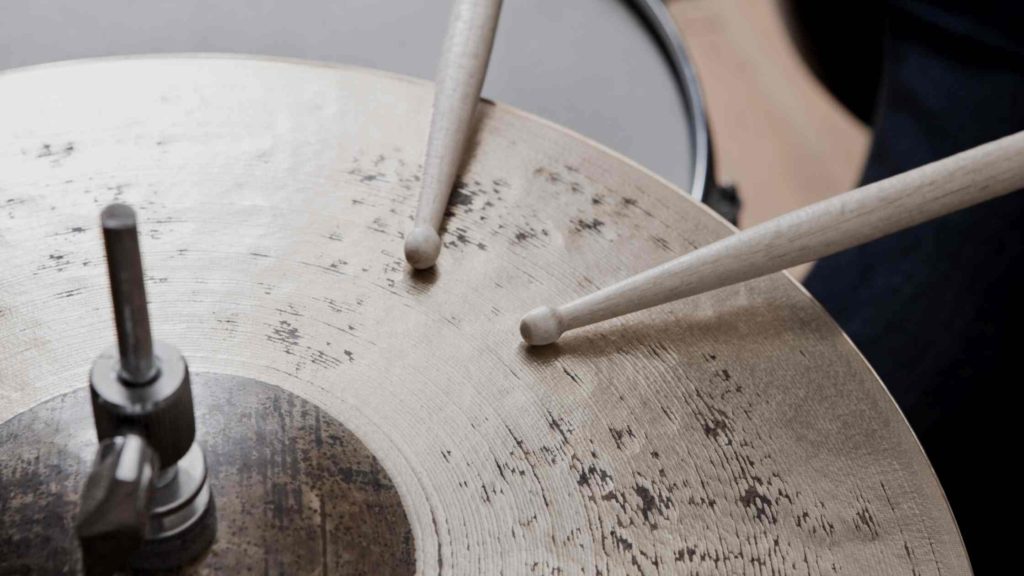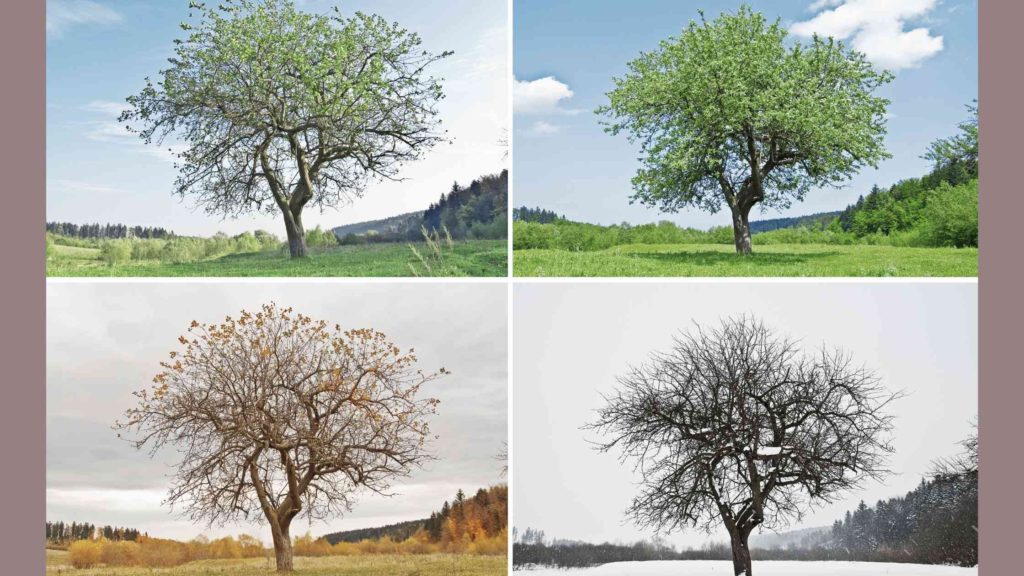Rhythm is a term we most often associate with music. But when you think about it, life has an inherent rhythm, i.e., recurring patterns of events that happen in a certain order in time.

“Ladies and gentlemen, we interrupt this previously scheduled rhythm…”
We honestly take many of the rhythmic aspects of our life for granted until they get interrupted: like when church is cancelled on a Sunday morning. Or the weather doesn’t behave as expected for a particular time of the year. Or the one that’s most memorable for everyone—that time in the recent past when the whole world went into a sort of pause when the pandemic started, and many were forced into lockdown and almost all normal activities came to a screeching halt.
It calls to mind the familiar sound effect of a needle scraping across a vinyl record, halting a good tune.
In the past year we’ve all experienced a little bit of what life is like without the seasonal rhythm markers. Many traditional family gatherings were at least altered in some way if not postponed or canceled altogether. When schools were unceremoniously closed in spring of 2020 and then all over the board in schedule and policy last year, another constant in the rhythm of the seasons was thrown out of whack.
It’s okay to slow down the tempo, but we NEED rhythm.
As I’ve mentioned in other posts, outside of the horrific implications and consequences of the pandemic, the pause was at first a nice respite. A bit of a breather. A little like an extended series of “snow days.”
But after a couple of weeks, I wasn’t ever sure what day it was. And the months even began to run together. Thankfully the changing weather (when it was actually seasonally appropriate) gave us some indication of the time of year. But many of the rites and celebrations of each season were hauntingly absent.
And of course none of us would ever choose to pay such a high price as a pandemic for the world to slow down a bit. But that’s not really the point. The point is we need routines, predictable cycles, and seasons in life. I believe it’s the way we’re designed.
But what about spontaneity??
Confession time: I’ve spent more than half my life carrying around the misguided notion that I’m incurably spontaneous. That I’m just not a routine-type person. And in truth, I’m prone to deviating from routines on an, ahem, routine basis… But I’m finally beginning to understand that I like everyone else NEED routine, or more precisely— “rhythm,” in my life. I guess it took some major interruptions in my own familiar rhythms for me to come to that realization.
I think perhaps rhythms of days and weeks that all of nature instinctively follows are a human need as well, to help keep us sane.

The Four Seasons: one of my favorite rhythms (and an awesome band from the 60s…)
Contrary to my mother-in-law’s love of year-round summer (she’s from South Florida), I’ve always sensed I have a psychological need for the changing of the seasons. Somehow, the yearly seasons are a rhythm to which I have NO objection.
I know people from tropical and sub-tropical climates mark the seasons in their own way. But I love how in most of the North America the searing heat of summer is welcome at least for a time, until most of us begin to crave cooler days and nights and an excuse to break out sweaters and pumpkin-spice-everything. Then, at least in the temperate zone, we get some extreme cold temps, and possibly snow and ice. And even that is nice in moderation, depending on your point of view (and level of pain tolerance!). And usually when I think I just can’t stand it anymore, things green up, and the temperatures turn to perfection on some rare, calm days of spring.
Each season brings with it glimpses of our Creator. New life in the spring, growth in the summer, harvest in the fall, and rest and a time of dormancy and expectation in the winter. All of these cycles remind us of the gospel: the story of God’s creation, the fall (in this case “the fall of man,” i.e. sin entering the world, NOT another word for autumn), a time of hope and expectation, and the glorious redemption.
I believe I need to bring the rhythm of days into a similar perspective.
We got the beat

And lest you think this whole rhythm thing is some sort of accident, consider how we’re wired: daylight releases chemicals in our brain that wake us up, and alternatively the darkness signals for us to rest. The entire planet turns on a rhythmic schedule (thankfully for us all), and the cycles of all life as we know it follow rhythmic patterns. All of our metabolic functions depend on rhythm for our survival, down to our breath and heartbeats. Rhythm is built into us.
I work with small babies in nursery at my church, and they have reminded me lately how much we are all made with rhythm and music in our soul. I was playing with one of my charges last night at church, and he began to spontaneously dance as I beat out a rhythm on a toy. It was hilarious and at the same time revealing. Check out this fascinating article about babies and rhythm.
Where is all this leading?
If the seasons have a rhythm, so, too, must our days and weeks be built around a rhythm.
I’m reminding you and me that such rhythm is not limiting, but instead life-giving. We all don’t have to stick to a march, of course. Remember, jazz has rhythm, too! And lots of it!
I say all of this not to cause you distress if you’re not particularly rhythmically inclined.
But instead to show you how much each of us is innately tuned in to rhythms. And how we can make rhythms work for us.
I think it’s important to examine and be aware of our daily, weekly, and monthly rhythms. To use them to our advantage. Below are a few ideas I came up with.
1) To build good habits, do certain things at the same time every day.
This one is SO hard for me!! But when we repeat things at the same time until they become automatic, we don’t have to use as many brain cells to get through our day! Volumes have been written on the subject because habit is such a powerful tool. I think it’s at least in part because it incorporates rhythm into our activities. Check out these amazing books about habits if you haven’t yet: The Power of Habit by Charles Duhigg, and Atomic Habits by James Clear.
2) Incorporate music into daily activities.
Add music into activities that are otherwise boring, repetitive, or unpleasant to you. I love to listen to music when I run or do repetitive chores. It turns the whole experience into pleasure rather than drudgery. And the rhythm can have some surprising benefits. Some combination of distraction and motivation actually has a sort of subconscious impact on our performance. Check out this fascinating article that details some of the benefits. https://www.runnersworld.com/news/a28172648/upbeat-music-motivates-sprint-workouts/
3) Respect your circadian rhythms. (This one is also hard for me!)
Your body functions better when you go to bed and get up at the same time every day. The temperate zone is LESS conducive to this habit, to my thinking, since our seasonal daylight varies pretty erratically (Don’t get me started on the whole daylight savings time topic again…!)
But as best we can, if we respect a regular bedtime and waking time, in addition to controlling what type of light exposure we have day and night, we can work with our body instead of against it. Not to get too technical, but the wavelengths in certain types of light like daylight (and screen lights) wake us up. Where other wavelengths (like candlelight) allow us to wind down. Armed with that knowledge, plan your mornings and evenings accordingly. (Just don’t fall asleep with a candle burning!!)
4) Embrace the change of seasons and the traditions that mark times of the year with your family and friend community.
In the Old Testament, God punctuated the year with a number of feasts. There were regular intervals of remembrance and celebration of God’s goodness and provision for His people. Christians have throughout history followed this example God set with His chosen people, and we set aside holy days of worship, remembrance, and celebration each year. Cultures everywhere also have yearly traditions and holidays that we celebrate, along with traditions within families. Not that they can’t get overdone (Black Fridays before Thanksgiving?? Come on…), but kept in check, these yearly markers give us opportunity for positive remembrances and building community.
5) Get in touch with some natural rhythms.
There is so much that nature can constantly teach us. Grow something. whether it be flowers or vegetables or like me, bacterial cultures that ferment my food. Pay attention to natural rhythms, like weather cycles, wind and tide. Spend time around animals and pay attention to their rhythms. I think such exercises shine a light on the genius and glory of our creator, and remind us that we’re not playing a solo, but we’re a part of great symphony of rhythm, or a gigantic jazz ensemble, if you will.

Familiar rhythms comfort us. They spur us on. They give us cues.
I’m hoping that if you’ve gotten out of step in all of the chaos in our world today, that you may be comforted in the knowledge of the gift of rhythm in your life, and find a way to get back into a “tranquilly domestic” groove.
Blessings,

P.S. If you’ve got a tune or two rolling around in your head after reading this article these two links might help: George Gershwin playing “I Got Rhythm,” and Harry Nilsson singing “How About You.” You’re welcome.
